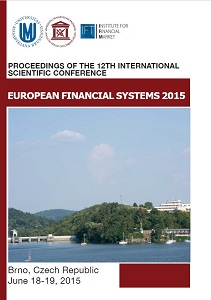Comparing Stock Market Efficiency with Detrended Fluctuation Analysis
Comparing Stock Market Efficiency with Detrended Fluctuation Analysis
Author(s): Galina Mukhacheva
Subject(s): National Economy, Evaluation research, Financial Markets
Published by: Masarykova univerzita nakladatelství
Keywords: efficient market hypothesis; random walk; detrended fluctuation analysis; DAX; SHCOMP;
Summary/Abstract: Efficient market hypothesis is a core assumption of financial economics upon which the majority of asset pricing models are built. Therefore, before employing asset pricing models for the cost of capital calculations and stock performance predictability, we need to test the random walk properties of stock prices. EMH is closely related to random walk hypothesis that implies unpredictability of stock returns behavior on financial markets. The measure of the random walk content of stock returns is computed with detrended fluctuation analysis of Peng et al. (1994). According to the EMH, the returns within time series present uncorrelated values and are not predictable on a historical basis. The detrended fluctuation analysis is implemented to check the possible correlations in price returns within the studied time series.
Book: European Financial Systems 2015: Proceedings of the 12th International Scientific Conference
- Page Range: 414-420
- Page Count: 7
- Publication Year: 2015
- Language: English
- Content File-PDF

